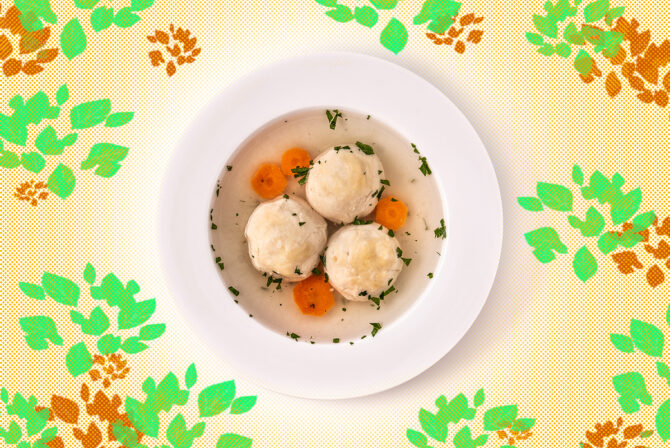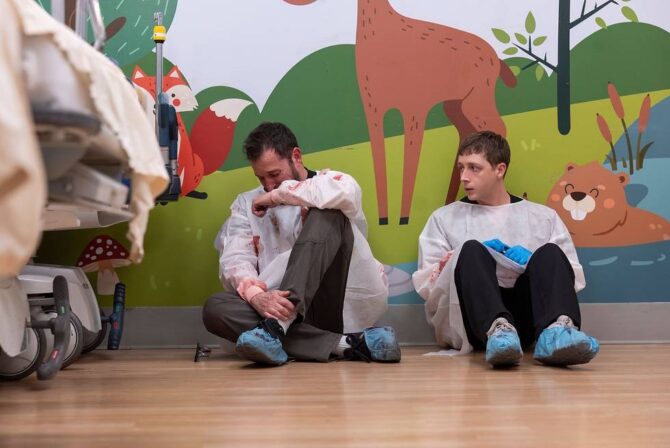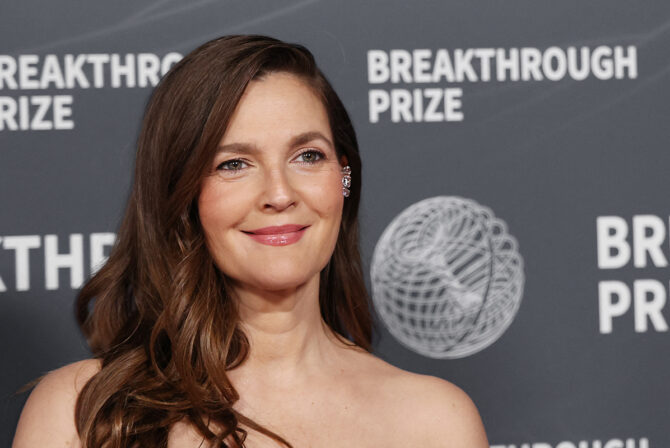If you don’t know of Gad Elmaleh, well, congratulations, because you are about to discover arguably one of the best comedic Jewish voices alive. Elmaleh, who was born in Casablanca, Morroco, is one of France’s biggest comedy stars, but he’s also imported some of his material to the U.S. — the name of his Netflix show is “Huge In France” and it is apt.
He’s friends with Jerry Seinfeld. He was in a Spielberg movie. He’s been married to the daughter of the Princess of Monaco (OK, that’s not a career achievement, just a fun fact that kind of lets you know the magnitude of his celebrity — this man has been married to literal royalty! Like the French Meghan Markle, if she was constantly putting out new material). He was knighted in both France and Quebec. But first and foremost, he’s just really, really funny.
Elmaleh is also always in movement. He grew up in Morocco, then in Montreal, then made a career in France, and then started creating new material in English. He’s been credited with bringing American-style stand-up specials to a French audience, and has played some of the biggest venues in the country and beyond. He’s done theater and movies and TV. He’s starred as comedic characters that are offensive and out there, and has also done incredibly powerful dramatic bits. He’s the French voice of Gru in “Despicable Me” and Seinfeld’s character in the French version of “Bee Movie,” which is how the two met (he’s been in “Comedians in Cars Getting Coffee”). He’s worked behind the camera as a director and writer. He played a French cook in an Adam Sandler movie. He had a Netflix special and an English language show and was on “This American Life.”
In his latest movie, “Stay With Us,” out in select theaters today, he’s exploring one of the most controversial decisions a Jewish person can make. His character, Gad, a kind of parallel universe version of himself, is converting to Catholicism, and like some characters would hide their “shiksa” (how I hate that word) girlfriends in films of yore, Elmaleh is hiding his relationship with the Virgin Mary from his family, played by his actual Jewish family — including his dad, David Elmaleh, who worked as a mime, his mother Regine, his brother Arie, a singer, and his sister Judith, a writer and actress.
The movie was so convincing that several news outlets had actually reported that Elmaleh converted (he assures me, he has not). Yet despite being a movie about one man’s journey with Christianity, I found it to be one of the best troves of Jewish wisdom I’ve encountered in a while. It has not one but two rabbis in it, including Delphine Horvielleur, one of France’s most high-profile female rabbis. And she seems to perfectly have his number.
“The House of Judaism is hard to define… it is broken and wobbly,” she tells him. “You know that, well, you know you’re broken,” she adds, saying that when she watches his career, “You’re always trying to get into the skin of someone who seems to be really comfortable with themselves… the skin of a guy who has his trunk all tidy.”
“Your trunk isn’t neat and tidy,” she informs him.
Kveller talked to Elmaleh, who was visiting his youngest son, Raphaël, in Monaco, about finding the beauty of Judaism, his Jewish family, the way wisdom from Jewish texts still guides him and how he loves to jolt people with jokes about circumcision. When we talked, he was in constant beautiful flux between languages — English, French and Hebrew — and between humor and thoughtful seriousness.
This interview has been condensed and edited for clarity.
I loved “Stay With Us” so much and laughed a lot. Do you think it’s fair to say this is a rom-com between a man and the Virgin Mary, and he gets the girl at the end?
I like this angle. Because to be honest with you, almost all the [perspectives] on the movie were either from the Jewish side, something very, “Oh my God, what is he doing? It’s a catastrophe!” which is totally understandable. I was born and raised in a very traditional family. So I know. And the movie is about that.
And Catholic people, when they saw the movie, they were like, “Oh my God, welcome!”
Please Gad, we want you!
Yeah, we need one more! But it’s neither this or that — it’s more complex. I like the way you talk about the romance. It’s kind of funny, but also real. My producer Isaac Sharry actually said that it’s a love story, about someone who’s falling in love.
It’s also a love letter to a Jewish mother. And I felt that it was very loving towards Jewish traditions.
Yeah, I think so.
The conversation with Rabbi Delphine Horvielleur, I felt very seen as a Jewish person. That’s what we are. I’m in a broken house, my trunk isn’t tidy.
Exactly. I think it’s interesting, because it’s the story of someone who is taking a detour, but I’ve never felt Jewishness so strong as when I’ve done the movie. So, when you do the detour, it reinforces who you are, bizarrely.
It also felt so Jewish for me, because part of being a Jewish parent is really wanting your kids to be Jewish, but you also can’t control it. I have two little boys and I’m trying to make them see all the beauty in Judaism, but you can’t control it.
I have two boys and the older one [Noé Elmaleh, a model], I really, really wanted him to do his bar mitzvah. He did it. We went to Israel. But he didn’t want to do it. Then the little one, I never talked about it, and every two days he is like, “When is my bar mitzvah?”
So I don’t understand. It’s so strange. They both have a Catholic mother and a Jewish father. Obviously the same father — I hope so.
With Delphine Horvilleur, I remember when she said, “OK, I’m going to be in the movie. You can ask me any questions, but I don’t want you to write the lines for me for my answers.” I found it worked really well with my method with “real cinema.” Because as you know, the parents are my actual parents, the priests are the priests and the other rabbi is a rabbi. So I liked the fact that she wanted to say what she felt about the questions.
She was so great, she was also talking about how you’re always moving from one place to the next — you move between so many identities. You are Moroccan and Canadian and French and Jewish and American a little bit…
And an Arab in a way, with Arab culture, Sephardic culture and Arabic language. In Morroco, when we sing at the synagogue, the melody is Andalusian or Arab… I love when the cultures mix. These days, I’m listening to Christian Lebanese Maronite chants. There are some songs as a devotion to a saint called St. Charbel. It’s so beautiful, but [when I listen to it,] I cannot tell if it’s a Jewish chant in a synagogue in Morocco or a Christian one…
There were moments in the movie where there is Hebrew music playing while we are seeing you in the church. And when I first heard it, it took me a minute to place it as Jewish.
We mixed the Kiddush, yeah.
I grew up in Europe and when we traveled, my parents always wanted to go see churches. For you it was “asur” (forbidden) but for me — my parents wanted me to go but I felt like I’m a Jewish person, I’m not supposed to be here.
I think that is so strong in the unconsciousness of the Jewish people. There is a law about “avodah zara,” that’s forbidden. I’m not arguing about that. But then you can choose to transgress. It’s like a kid who does bad things just to tease people. Maybe I like to do things that I’m not supposed to do.
You like to be transgressive.
Even as a game. For example, sometimes very traditional Jews stop me in the street, even if they are fans, and they’re like, “Gad, can you please tell us, is your son baptized or has he had a circumcision?” So I made up some stuff just to play with them. I said, “There was a priest who was holding him in the water [for the baptism] and then the mohel came and he cut and then a guy came up and said ‘hamdulillah!'” Just to be crazy. Because it’s a stupid question, you know?
Your family is so good in the film. I want Regine in everything now. She’s so beautiful, your mom.
They are not playing, I would say.
Your sister Judith also has some incredible lines.
She’s unbelievable. She makes fun of me. She invented a lot of lines, like all the parts of “you only think about Gad, there’s only Gad for you” — that was not in the script.
It felt so real!
That’s what she wanted to say!
Did you do anything for Passover this year?
Yeah, of course. Moroccan seder is very long. We have this tradition. We all read. We do the whole thing. I do just one night. I used to do two nights in Morocco, then I do just one night and, like any lazy Jew, I say I do like they do in Israel.
Whenever I’m in Paris, every Shabbat I am with my parents, we do Shabbat. We sing, we do the brachot [blessings]. I studied in yeshiva. So I have strong religious education. I didn’t study a lot, but those two years in yeshiva were very, very, very intense.
And it stays with you, all that knowledge.
But in a good way. Like, I didn’t want to learn Mishnah, the Talmud and the Gamarah and all that. But I find sometimes some concepts are really useful. I can relate to them and connect in life with those concepts. For me, the base of all my life is [the line from the Mishnah] “na’aseh ve’nishmah,” —”we will do and then we will see.” That’s all my life.
In the movie, you make a list of pros and cons for converting to Christianity, and in the cons part, you write that if you convert, you will never shoot a film with Spielberg again. It might be one of my favorite jokes. So now that we know you didn’t actually convert…
I didn’t.
When will you do that movie with Spielberg?
I did one. I worked with him. I did this small part in “Tintin.”
Oh yeah, that’s right!
I’ve worked with him and I had this great, wonderful opportunity. I met him and I’ve known him and I love him. By the way, I hope he will hear about that.
Steven Spielberg, please cast Gad in something so he doesn’t convert!








